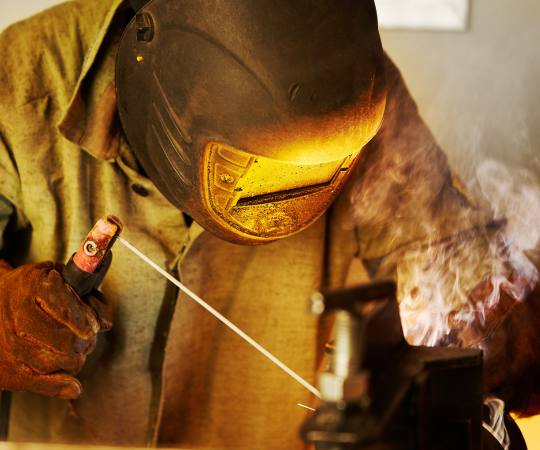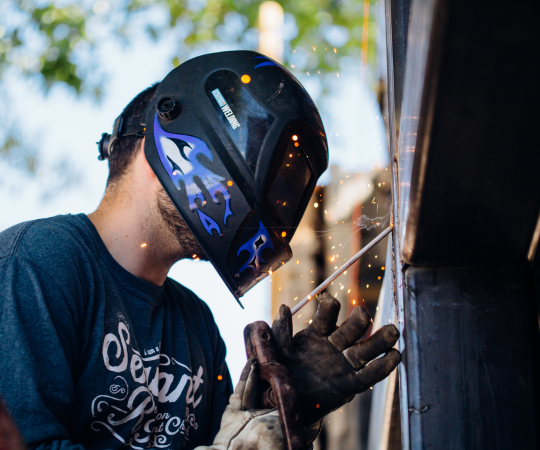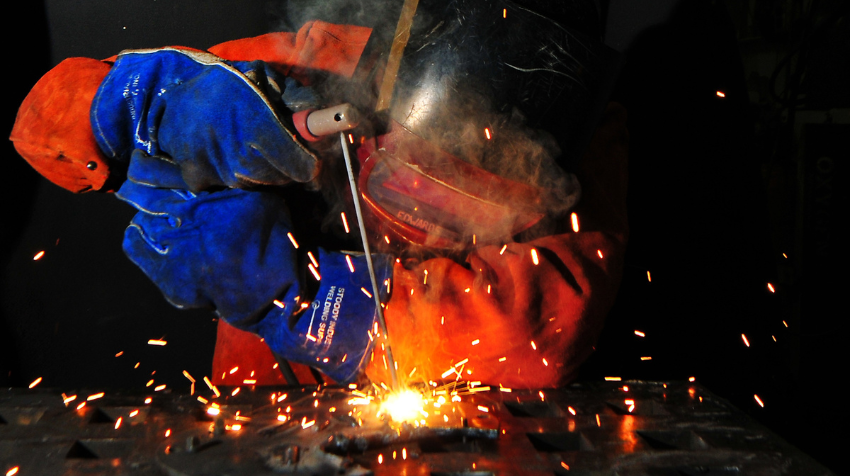Unlocking Lucrative Opportunities: Navigating Entry-Level Welding Careers for High Pay
Are you looking for a career that is both lucrative and hands-on? If so, welding may be the perfect fit for you. Welding has become an increasingly popular profession in recent years, with high demand for skilled welders across various industries.
However, breaking into welding can be challenging if you don’t know where to start. But fear not! In this article, we will guide you through the essential steps to break into welding and secure high paying entry-level jobs.
From identifying your goals and interests in welding to acquiring necessary training and certifications, gaining hands-on experience, networking and building your professional reputation, to preparing for job interviews and negotiations – we’ve got you covered.
So sit back, relax, and let us help you kickstart your career in welding!
Identify Your Goals and Interests in Welding
Discovering what drives your passion in welding can be a significant factor in securing high paying entry-level jobs. Welding is a multi-faceted field with various job prospects and career growth, but you need to identify your goals and interests before pursuing any particular path.
If you have an affinity for working with metals, solving problems, creating things from scratch, and enjoy hands-on work, then welding could be the perfect career path for you.
Job prospects in welding are vast and varied. You can work in industries such as construction, automotive manufacturing, aerospace engineering, shipbuilding, oil/gas refineries or even start your own business.
Career growth opportunities are also abundant in this industry. You can progress from an entry-level welder to become a supervisor or manager of a team of welders with time and experience. Acquiring the necessary training and certifications is the next step towards achieving these goals.
Acquire the Necessary Training and Certifications
You probably already have all the necessary training and certifications to start welding, right? Well, if not, don’t worry.
There are a variety of training options available to help you acquire the skills you need. You can enroll in a vocational school or community college program that offers welding courses. These programs typically range from six months to two years in length and cover topics such as welding safety, blueprint reading, and different types of welding techniques.
Another option is to complete an apprenticeship program with a local union or trade organization. Apprenticeships provide on-the-job training under the guidance of experienced welders and can take anywhere from one to four years to complete.
Regardless of which route you choose, it’s important to understand the certification requirements for your desired field. Most employers require their welders to hold certifications in specific techniques such as MIG or TIG welding. Obtaining these certifications involves passing written and practical exams administered by organizations such as the American Welding Society (AWS).
Now that you know about the different training options and certification requirements for welding, it’s time to gain some hands-on experience.

Gain Hands-On Experience
Now it’s time to get your hands dirty and start practicing your welding skills, feeling the heat of the torch as you create something new. The best way to gain hands-on experience is through apprenticeship opportunities. Look for companies that offer these programs and apply as soon as possible. This is a great way to learn from experienced welders and get on-the-job training.
Practicing safety measures is also crucial when gaining hands-on experience in welding. Always wear protective gear such as gloves, glasses, and helmets to avoid injury. Additionally, make sure you’re working in a safe environment free from flammable materials or other hazards. By being diligent about safety measures, you can build trust with employers and show them that you take this profession seriously.
With proper training and practice, you’ll be able to take on more complex projects in no time. As you gain more experience in welding, it’s important to network and build your professional reputation within the industry before moving on to higher-paying jobs.
Network and Build Your Professional Reputation
As you strive to build your professional reputation and network within the welding industry, attending industry events and conferences is a key strategy. These events provide valuable opportunities to connect with other professionals in your field, learn about emerging trends, technologies, and techniques, and showcase your skills and knowledge.
Additionally, seeking out mentorship opportunities from experienced welders can help you gain insights into the industry’s best practices while building meaningful relationships that can advance your career prospects.
Attend industry events and conferences
Attending industry events and conferences can be a great way to network with professionals and learn about new advancements in the welding field. The benefits of networking can’t be overstated, as it allows you to exchange information, build relationships, and gain insights into the industry. This could lead to potential job opportunities or even mentorship from experienced welders who can guide you through your career.
To make the most out of industry events and conferences, here are some tips for making industry connections:
- First, do your research on the event’s agenda and attendees beforehand. This will help you identify which sessions or workshops would be valuable for you to attend and which professionals you should try to connect with.
- Second, bring business cards and prepare an elevator pitch introducing yourself and your skills.
- Lastly, follow up with new connections after the event by sending them a personalized email thanking them for their time and expressing your interest in staying connected.
Attending industry events is just one aspect of building a successful career as a welder. In addition to networking opportunities, seeking mentorship from experienced welders can provide guidance on technical skills, safety practices, and career advancement strategies.
Seek out mentorship opportunities
To truly excel in your welding career and reap its benefits, don’t underestimate the power of mentorship. Finding the right mentor can offer you invaluable guidance on technical skills, industry practices, and career advancement strategies that you may not learn in school or at work.
Moreover, a good mentor can provide emotional support as you navigate the ups and downs of the job market and help you build a network within the welding community. Benefits of mentorship are plentiful. You’ll gain access to insights from experienced welders who’ve already climbed up the ranks in their careers.
They can share with you what works and what doesn’t when it comes to job hunting, negotiating salaries, or expanding your skill set. A good mentor will also challenge you to step out of your comfort zone and take risks that could lead to new opportunities.
Keep this in mind as we move on to preparing for job interviews and negotiations – having a strong support system is key!
Prepare for Job Interviews and Negotiations
Gear up for interviews and negotiations like a pro by fine-tuning your communication skills, mastering the art of persuasion, and learning to negotiate with confidence.
When preparing for job interviews, it’s important to research the company beforehand and be familiar with their values, mission statement, and goals. Practice answering common interview questions and have a list of relevant questions to ask the interviewer as well. Make sure to dress appropriately and arrive on time or even a few minutes early.
During salary negotiations, make sure you have done your research on average salaries for similar positions in your area and come prepared with a range that you feel comfortable discussing. Be confident in your worth but also willing to compromise if necessary. Remember to maintain professionalism throughout the negotiation process even if things become tense or difficult.
By demonstrating strong communication skills and negotiating confidently, you can increase your chances of securing a high paying entry-level welding job.

Frequently Asked Questions
What are the typical starting salaries for entry-level welding jobs?
As you begin your search for entry-level welding jobs, it’s important to keep in mind the salary expectations and job market demand.
On average, starting salaries for entry-level welders range between $15-$20 per hour depending on location and company. However, with experience and skill development, welders can earn significantly more.
It’s worth noting that the demand for skilled welders is high in many industries including construction, manufacturing, and oil & gas.
With a growing need for infrastructure improvements across the country, now may be an ideal time to enter the welding industry. By honing your skills and staying up-to-date with industry advancements, you can secure a high-paying career in this field.
What are some common misconceptions about the welding industry?
You might be surprised to learn that many people have misconceptions about the welding industry. There are a lot of myths floating around, but it’s important to separate fact from fiction if you’re considering a career in welding.
Some of the most common misconceptions include the belief that welding is an easy job, that it doesn’t require much skill or training, and that it’s not a high-paying field. However, these beliefs couldn’t be further from the truth.
Welding requires a great deal of skill and expertise, as well as ongoing training and certification. It’s also a highly lucrative field with plenty of opportunities for advancement and growth.
So if you’re interested in debunking welding myths and learning more about this exciting industry, now is the time to get started!
How do you stay up-to-date with the latest welding technology and techniques?
To stay up-to-date with the latest welding technology and techniques, it’s crucial to invest in ongoing welding education and obtain welding certifications.
Welding education can come in various forms, such as attending trade schools or community colleges that offer welding programs, participating in apprenticeships or on-the-job training programs, or taking online courses.
Obtaining welding certifications from reputable organizations like the American Welding Society (AWS) can also demonstrate your expertise and commitment to the industry.
By continually expanding your knowledge and skills through education and certifications, you’ll be better equipped to take advantage of new opportunities in the constantly evolving field of welding.
What are some potential career paths for someone starting out in welding?
If you’re starting out in welding, there are plenty of potential career paths to explore. With specialized certifications and a dedication to career advancement, the possibilities are endless.
In fact, according to the Bureau of Labor Statistics, employment of welders, cutters, solderers, and brazers is projected to grow 3 percent from 2019 to 2029. This means that there will be more opportunities for entry-level welders who want to advance their careers and specialize in certain areas like robotics or aerospace welding.
Whether you see yourself working in construction or manufacturing, with hard work and determination, you can carve out a successful career in the world of welding.
How important is physical fitness and strength in the welding profession?
Physical fitness and strength are crucial components of safety in the welding profession. Welding involves working with heavy equipment, handling materials, and being on your feet for long hours. Therefore, it’s important to have a certain level of physical fitness to avoid injuries and accidents.
Additionally, training techniques emphasize the importance of proper posture and auto body welding near me tasks. Being physically fit also allows you to work efficiently and effectively, which can lead to higher productivity levels.
In short, staying physically fit and following safety guidelines are essential elements for success in the welding profession.
Conclusion
Congratulations! You’ve successfully learned how to break into the world of welding and secure high-paying entry-level jobs. By identifying your goals and interests in welding, acquiring necessary training and certifications, gaining hands-on experience, networking, building your professional reputation, and preparing for job interviews and negotiations, you’re well on your way to a successful career in welding.
Did you know that according to the Bureau of Labor Statistics, the median pay for welders, cutters, solderers, and brazers was $42,490 per year as of May 2020? This is well above the median annual wage for all occupations. With the right skills and experience under your belt, you could potentially earn even more than this amount.
As a welder, you’ll play an important role in various industries such as construction, manufacturing, transportation, and more. Your expertise will be highly valued by employers who are willing to offer competitive salaries and benefits packages to attract top talent like yourself.
So don’t hesitate any longer – start taking action today towards achieving your goals in welding!
Related Source

